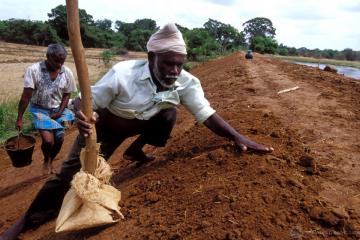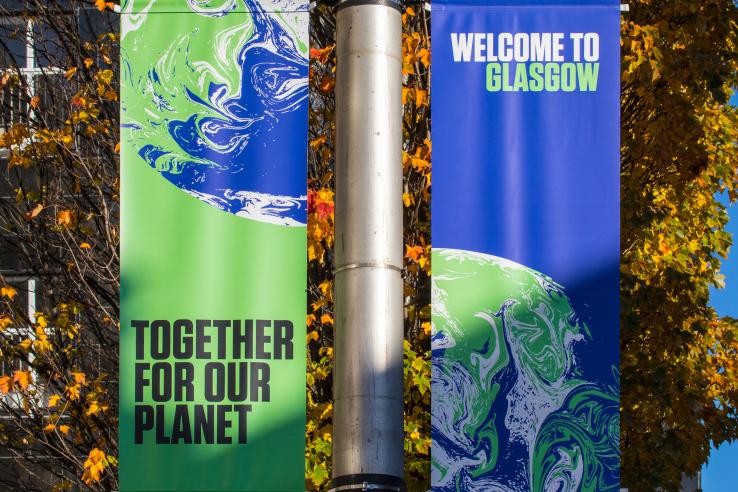
How evidence from randomized evaluations can inform climate finance at COP26

Last week, the United Nations Framework Convention on Climate Change kicked off the 26th Climate Change Conference of the Parties, or COP26, in Glasgow. Members of J-PAL’s King Climate Action Initiative (K-CAI) staff team are on the ground at the conference, speaking at events, hosting meetings with potential partners, and learning from our climate colleagues.
K-CAI, in partnership with King Philanthropies, supports evidence generation and catalyzes the scale-up of high-impact policy solutions at the nexus of climate change and poverty alleviation, aiming to improve the lives of 25 million people over the next decade. At COP26, K-CAI staff are meeting with partners to innovate, test and scale evidence-informed climate solutions to help reach this goal.
Every year, the COP brings together global leaders to discuss ambitious policy and technological approaches to mitigate and adapt to climate change. This year, though, the conference is more significant than ever—marking five years since the historic Paris Agreement.
Now, countries are being asked to submit new climate action plans, or Nationally Determined Contributions (NDCs). 2021 is described as a “make or break” year for climate action by the World Meteorological Organization, and with climate impacts continuing to worsen and the dire findings of the IPCC’s latest report on climate change, the urgency for significant climate strategies has never felt greater.
A large component of success at COP26 is mobilizing climate finance. In 2015, as part of the Paris Agreement, high-income nations pledged $100 billion a year by 2020 to low- and middle-income countries to support achieving their NDCs. It was recently announced that high-income nations have failed to meet this financing commitment and will likely be three years late to deliver these funds. Climate finance will be key for rebuilding trust between nations in order to effectively address climate change.
But financing alone cannot guarantee effective climate mitigation and adaptation action. Technological and policy innovations do not always achieve their desired effects when they are implemented in the field. Although there is substantial evidence about the causes of climate change and its effects, evidence on the impacts of climate solutions on people and the planet is lacking. Following COP26, decision-makers will be looking for the best climate strategies to invest in—it is critical that financing goes towards and is informed by evidence generation so that we can know the outcomes of climate innovations in real-world settings prior to scaling and have the greatest impact possible.

Investing in climate solutions that work
In order to avoid the worst impacts of climate change, we need to abate as many tons of greenhouse gas emissions as possible, as soon as possible. Leaders will undoubtedly renew or increase their emissions reduction commitments at COP26, but this is easier said than done.
For example, in a randomized evaluation focused on reducing energy consumption, low-income households were randomly assigned to receive encouragement and assistance to apply for a fully-subsidized residential energy efficiency program in order to test whether these strategies were effective. Despite the intervention, only a small percentage of the eligible households enrolled, and the energy savings of those who did was only around half of the upfront cost of the efficiency improvements. This study exemplifies how factors such as low take-up and savings not matching projections in real-world settings can impact the cost-effectiveness of climate innovations, underscoring the need to evaluate investments in the field before they are scaled.
Reducing greenhouse gas emissions will help everyone avoid the worst effects of climate change, which are locked in to intensify over the next thirty years. People in low- and middle-income communities and countries who have the fewest resources to adapt will likely bear the brunt of global inaction.
Adaptation strategies are also an important goal at COP26, but like reducing emissions, simply investing in innovations is not sufficient—climate finance must support their evaluation in the field.
An ongoing randomized evaluation in India, funded by K-CAI, is measuring the impact of payments as incentives to reduce groundwater depletion among smallholder farmers. As climate change threatens precipitation and surface water supplies in many regions, effective groundwater management is a key climate adaptation strategy for rural communities. Studies such as this have the potential to contribute essential knowledge to climate investments and which policies are scaled up—but much more practical evidence is needed.
Success at COP26
As global leaders renew and increase their emissions reduction commitments and work to mobilize climate finance at COP26, it’s critical for evidence from rigorous randomized evaluations of potential solutions to guide policy decisions. Without evidence, climate financing and other resources may be squandered on strategies to address climate change that are not effective in the real world.
At J-PAL, K-CAI works to bridge the gap between evidence and policy. Through this work and collaboration between researchers and decision-makers, we can learn and generate new evidence as we take action in order to avoid the worst effects of climate change.
To learn more about partnership opportunities, please contact us at [email protected].
